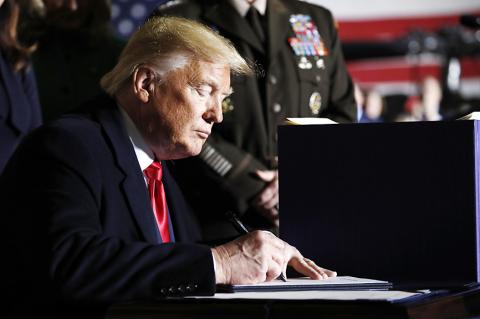The Ministry of Foreign Affairs yesterday thanked US President Donald Trump for signing legislation friendly toward Taiwan, while saying it is watching US-China interactions closely, after Chinese President Xi Jinping (習近平) reportedly told Trump he was concerned about the US’ friendliness toward Taipei.
With funding of US$738 billion, the National Defense Authorization Act for Fiscal Year 2020 was signed into law by Trump on Friday, after it was passed by the US Senate on Tuesday and the US House of Representatives on Wednesday last week.
The act requires the US director of national intelligence to deliver a report on Beijing’s interference campaigns targeting Taiwan’s elections and US responses to such campaigns within 45 days of an election in Taiwan.

Photo: AP
The Pentagon and the US Department of State are required to present reports within 180 days of the act’s implementation on reviewing the US’ Taiwan Relations Act and on Beijing’s influence over Taiwan’s security and economy as well as the cross-strait balance.
It also requires the US secretary of defense to submit a report on establishing a high-level interagency US-Taiwan group to tackle new cybersecurity issues within 180 days of the act taking effect.
Taiwan thanked Trump’s administration and the US Congress for their consistent support and commitment to Taiwan’s security, ministry spokeswoman Joanne Ou (歐江安) said in a statement yesterday.
In the face of escalating tensions in the region, Taiwan would continue to accelerate its investment in national defense to boost its self-defense capabilities, she said.
Before signing the bill, Trump had talked with Xi, who reportedly raised concerns about the US’ attitude toward Taiwan.
“Had a very good talk with President Xi of China concerning our giant Trade Deal. China has already started large scale purchaes [sic] of agricultural product & more. Formal signing being arranged. Also talked about North Korea, where we are working with China, & Hong Kong (progress!),” Trump wrote on Twitter on Friday.
Chinese state-run Xinhua news agency yesterday confirmed the telephone call, but said that Xi had also broached the topic of Taiwan.
“We have expressed serious concern over the US’ passive remarks and deeds in issues related to Taiwan, Hong Kong, Xinjiang and Tibet, which interfered in China’s internal affairs, damaged China’s interests and might hinder bilateral cooperation,” Xi was quoted as saying.
Xinhua quoted Trump as saying he believes that the US and China could handle discrepancies and continue to maintain ties.
Ou said that the US has repeatedly reaffirmed its commitment to Taiwan and approved five arms sale packages during Trump’s administration.
The ministry has been closely watching interactions between high-level US and Chinese officials, while maintaining diverse and smooth communication channels with the US, she added.

MAKING WAVES: China’s maritime militia could become a nontraditional threat in war, clogging up shipping lanes to prevent US or Japanese intervention, a report said About 1,900 Chinese ships flying flags of convenience and fishing vessels that participated in China’s military exercises around Taiwan last month and in January last year have been listed for monitoring, Coast Guard Administration (CGA) Deputy Director-General Hsieh Ching-chin (謝慶欽) said yesterday. Following amendments to the Commercial Port Act (商港法) and the Law of Ships (船舶法) last month, the CGA can designate possible berthing areas or deny ports of call for vessels suspected of loitering around areas where undersea cables can be accessed, Oceans Affairs Council Minister Kuan Bi-ling (管碧玲) said. The list of suspected ships, originally 300, had risen to about

DAREDEVIL: Honnold said it had always been a dream of his to climb Taipei 101, while a Netflix producer said the skyscraper was ‘a real icon of this country’ US climber Alex Honnold yesterday took on Taiwan’s tallest building, becoming the first person to scale Taipei 101 without a rope, harness or safety net. Hundreds of spectators gathered at the base of the 101-story skyscraper to watch Honnold, 40, embark on his daredevil feat, which was also broadcast live on Netflix. Dressed in a red T-shirt and yellow custom-made climbing shoes, Honnold swiftly moved up the southeast face of the glass and steel building. At one point, he stepped onto a platform midway up to wave down at fans and onlookers who were taking photos. People watching from inside

Japan’s strategic alliance with the US would collapse if Tokyo were to turn away from a conflict in Taiwan, Japanese Prime Minister Sanae Takaichi said yesterday, but distanced herself from previous comments that suggested a possible military response in such an event. Takaichi expressed her latest views on a nationally broadcast TV program late on Monday, where an opposition party leader criticized her for igniting tensions with China with the earlier remarks. Ties between Japan and China have sunk to the worst level in years after Takaichi said in November that a hypothetical Chinese attack on Taiwan could bring about a Japanese

The WHO ignored early COVID-19 warnings from Taiwan, US Deputy Secretary of Health and Human Services Jim O’Neill said on Friday, as part of justification for Washington withdrawing from the global health body. US Secretary of State Marco Rubio on Thursday said that the US was pulling out of the UN agency, as it failed to fulfill its responsibilities during the COVID-19 pandemic. The WHO “ignored early COVID warnings from Taiwan in 2019 by pretending Taiwan did not exist, O’Neill wrote on X on Friday, Taiwan time. “It ignored rigorous science and promoted lockdowns.” The US will “continue international coordination on infectious